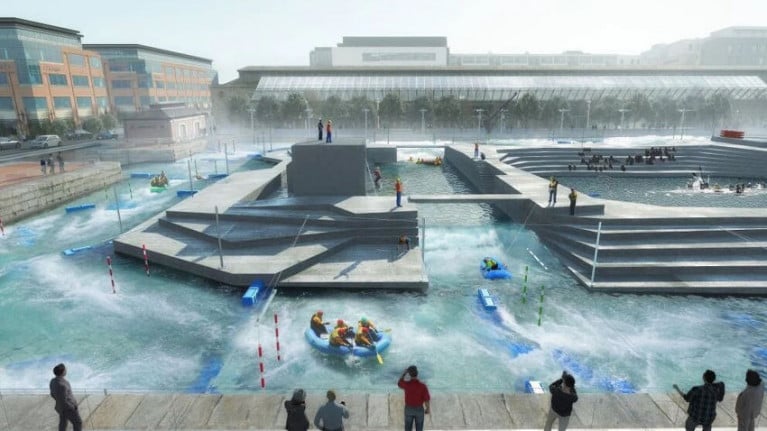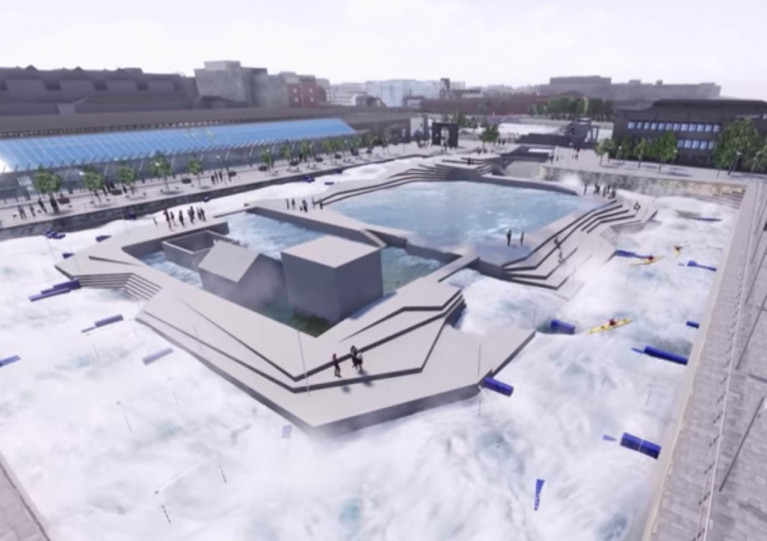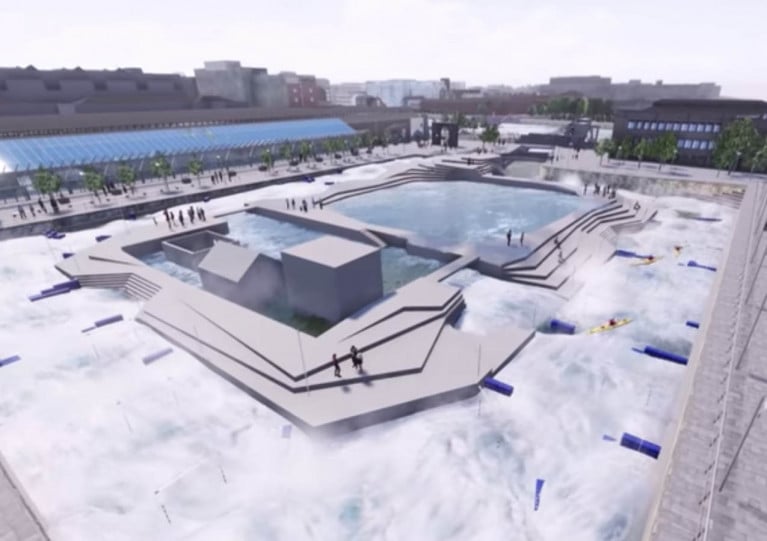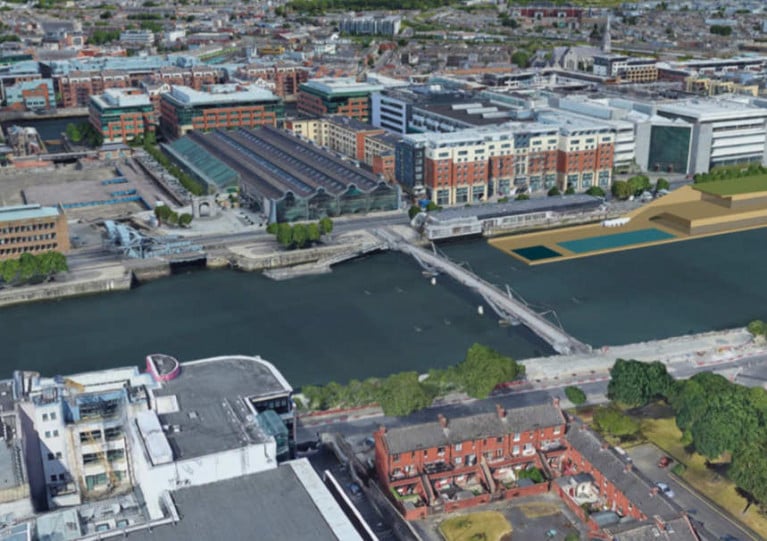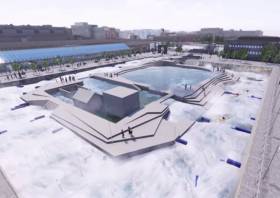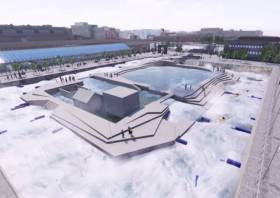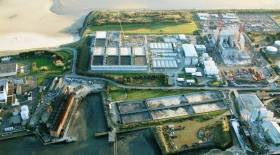Displaying items by tag: Dublin City Council
New Study Considers Recreation Value of Grand Canal in Dublin’s South Central Area
Waterways Ireland and Dublin City Council have launched a new study that considers the outdoor recreation opportunities of the Grand Canal and its towpaths and land resources in Dublin’s south central area.
The jointly commissioned report by Irish Leisure Consultants, titled The Grand Canal Recreation Activation and Animation: Portobello to Kylemore Road, is informed by the views and knowledge of local communities and stakeholders as well as the ambitions of national and local strategies and plans.
The area in question has limited on-water activity at present, even though it has one of the longest stretches of the canal in the city with no navigation locks.
The Grand Canal and its towpaths represent a significant opportunity to unlock the potential of this inland waterway asset for local communities, Dubliners and visitors to the city.
The consultation process identified positive, strong and diverse connections among residents and communities with this section of the Grand Canal, including recreational uses, environmental stewardship, heritage, and active travel. The report emphasises the importance of balancing of opportunities and responsibilities to increase quality of life and provide for a diverse range of needs and interests.
The report also recommends a collaborative approach, with an initial programme of community-based activities and leadership training to enhance a sense of place and develop perceptions and engagement with the canal, followed by the physical development of a series of links, nodes and zones along the canal.
In spring and summer this year, the project partners say they will work with local stakeholders to pilot a number of on-water activities and explore sustainable initiatives to unlock the potential of the city’s Grand Canal.
Smart Ring Buoys Launched by Dublin City Council to Save Lives and Improve Water Safety
Dublin City Council, in partnership with Water Safety Ireland and the Department for Rural and Community Development, this week launched an innovative ‘Smart Ring Buoys’ project aimed at saving lives in Ireland’s waters.
The Smart Dublin initiative worked with technology partners Civic Integrated Solutions Ltd, mSEMICON Teoranta and ZiggyTec Ltd to develop the low-cost lifesaving technology, which will provide real-time alerts when life rings are stolen or tampered with.
Anti-social misuse of life buoys is an issue for councils across Ireland, and more than 600 sensors will now be installed in eight local authorities including Fingal County Council, Dun Laoghaire-Rathdown County Council, South Dublin County Council, Dublin City Council, Laois County Council, Meath County Council, Sligo County Council and Limerick City & County.
The Smart Ring Buoy technology works through low-cost sensors paired with a mobile, map-based platform with real-time monitoring. It will alert water safety officers when ring buoys are tampered with or go missing and ensure their timely replacement. This is an essential and lifesaving action as a stolen ring buoy could mean a stolen life.
Minister for Rural and Community Development, Heather Humphreys said: “In 2021 alone, we tragically lost 80 lives through drowning. Such incidents have devastating and long-lasting effects on families and communities.
“Safety tools like ring-buoys are in place to save lives and protect people when they are close to water. Sadly, the theft or vandalism of this life saving equipment is still commonplace in both our rural and urban communities.
“The initiative that I am launching today [Wednesday 26 October] in conjunction with Dublin City Council is both unique and important. With the support of funding from my department’s Digital Innovation Programme, we will roll out this sensor technology in 8 different local authorities.
“This project is a leading example of how the public sector is tacking community challenges with innovative approaches. I want to commend Dublin City Council and all the project partners and stakeholders involved.”
The project began back in 2018 as part of a workshop to identify challenges in Dublin’s Smart Docklands area. Members of the community highlighted that ring buoys were frequently being stolen or tampered with, with a delay to replacement devices being installed.
‘These smart ring buoys will detect when this essential public rescue equipment is interfered with or stolen’
At present, around 15 ring buoys go missing or are stolen every week from Dublin City Council alone costing over €20,000 per annum for replacement.
Dublin City Council says it realised that this was a problem not just in Dublin but across Ireland and set out to find a solution through its Smart Dublin innovation programme. Across Ireland there are approximately 5,000 life buoys installed.
The project has taken what’s described as a “unique” approach to procurement in an Irish context, led by Dublin City Council, where the Dublin local authorities have been able to pilot a number of innovative solutions initially and then purchase the best solutions as part of a wider framework with 23 local authorities.
In addition, the project was shortlisted for an Innovation leadership award from the European Innovation Council, recognising the efforts done by the public sector to promote and implement innovation procurement across Europe.
Speaking about the new scheme, Dublin City Council chief executive Owen Keegan said: “This is a great example of collaboration across the Irish local authorities and Water Safety Ireland through our Smart Dublin programme. It is also the first time we have used a procurement approach like this to pilot an innovative technology solution before we buy.
“We look forward to scaling this type of approach to accelerate the deployments of new innovations that can address city challenges.”
Roger Sweeney, acting CEO of Water Safety Ireland said: “Every year, ring buoys are used by the public to save lives from drowning however many ring buoys are regularly stolen or vandalised. A stolen ring buoy can mean a stolen life. Ring buoys play a critical role in drowning prevention but to do so they must always be available and in place.
“These smart ring buoys will detect when this essential public rescue equipment is interfered with or stolen. They will save on the time that is currently needed to monitor and replace them and they will provide this information 24 hours a day.
“The increased number of visitors to our waterways nationwide has placed a greater emphasis on the need for such innovative water safety solutions that can help prevent tragic drownings. Water Safety Ireland is delighted to be involved in this project which will help save lives.”
Lack of financial and public support is being cited as the reason for scrapping plans for a white-water rafting course in Dublin city centre, as RTÉ News reports.
Costs for the controversial scheme planned for George’s Dock had risen to €25 million earlier this year as Dublin City Council (DCC) sought expressions of interest in the contract for the project.
It followed shortly after a council statement that it remained “hopeful” of securing the funds required for the “elite” white-water rafting and kayaking circuit, which was first suggested in early 2018.
However, DCC’s Capital Programme 2022-2024 report, from chief executive Owen Keegan, says there has been a “considerable amount of negative commentary related to this project…that appears impossible to reverse and that has undermined the planned funding of the project”.
RTÉ News has more on the story HERE.
Costs of Dublin White-Water Rafting Project Rise to €25m as Council Seeks Expressions of Interest
Coats for the controversial white-water rafting centre proposed for George’s Dock have risen to €25 million as Dublin City Council seeks expressions of interest in the contract.
RTÉ News reports on the latest figures release by the council which show an additional €2 million in costs since the project was approved over a year ago.
The council documents also advise would-be contractors that the scheme remains “subject to funding” following issues that emerged last year.
In December the council said it “remains hopeful” of securing the funds required despite the State rejecting a grant application that would have covered a quarter of its costs.
The ‘elite’ white water rafting circuit was first mooted in early 2018 when a design tender was issued as part of redevelopment plans for George’s Dock, adjacent to the IFSC in the city centre.
City councillors were presented with plans in January 2019, with costs estimated at €12 million for a facility serving ‘elite kayak slalom’ squads, as well as training for emergency services besides potential recreational use.
Then Dublin Lord Mayor Nial Ring described the scheme as a “white elephant”.
RTÉ News has much more on the story HERE.
Dublin City Council Aims to Lock Down Funding as Tender for White-Water Rafting Project Pushed Back to 2021
The white-water rafting course proposed for Dublin city centre is still on the agenda — though the tender for its construction has been pushed back to next year.
According to TheJournal.ie, it’s emerged that “challenges” arising from the coronavirus pandemic have forced a delay in Dublin City Council’s plans.
It’s also reported that the council “remains hopeful” of securing the funds needed for the controversial €23 million project — despite the State rejecting a grant application that would have covered more than a quarter of its costs.
TheJournal.ie has much more on the story HERE.
The Government has refused a grant application from Dublin City Council that would have funded its plans for a white water rafting course in the city centre to the tune of €6.6 million, as TheJournal.ie reports.
Councillors who voted last December to approve the controversial plans for George’s Dock were told that that €5 million of the project’s €23 million cost would come from development levies, with €4 million from the council’s own reserves, and the rest coming from grants, predominantly from the State.
But it’s now emerged that just weeks after the council vote, an application by the local authority made last year under scheme 1 of the Large Scale Sports Infrastructure Fund was refused as it “did not score highly enough”.
The news comes a week after the council announced proposals for a floating outdoor pool and sauna faclility adjacent to the George's Dock scheme.
TheJournal.ie has much more on the story HERE.
A site on Custom House Quay adjacent to the planned white water rafting course in George’s Dock has been earmarked for a €15 million outdoor pool, as TheJournal.ie reports.
The scheme being proposed by Dublin City Council is modelled after a similar facility in Helsinki, Finland — complete with a pool floating on the River Liffey and saunas in an adjacent quayside complex.
It also appears superficially similar to the ‘urban beach’ project that was proposed for Dun Laoghaire, in the vein of Berlin’s Badeschiff, but was put on hold a number of years ago over funding issues within the former Dun Laoghaire Harbour Company.
Custom House Quay was chosen as the optimum site for the project as its proximity to the controversial rafting course would help develop the area “into a hub for water based recreational activity in the city”, says Docklands area manager Derek Kelly.
TheJournal.ie has more on the story HERE.
Councillors Approve White Water Rafting Centre For George’s Dock
Dublin City councillors have voted to approve controversial plans for a white water rafting course in the city centre’s George’s Dock that has already seen the council spend half a million euro, as The Irish Times reports.
Plans for the ‘elite’ rafting circuit, which would form a perimeter around the dock between the IFSC and the CHQ building, were first mooted in early 2018 and shown to councillors at the beginning of this year before falling off the agenda.
Last week it emerged that the then estimated €12 million cost had almost doubled for the plans, which were revived after a change in the council’s makeup following summer’s local elections. Previously they had been criticised by former lord mayor Nial Ring as a “white elephant”.
In a meeting last night (Monday 2 December) councillors were told that €5 million of the project’s now €23 million cost would come from development levies, with €4 million from the council’s own reserves, and the rest coming from grants — predominantly from the State.
Aside from envisaged “elite kayak slalom training”, the centre is also aimed for training use by emergency services. Assistant chief fire officer Greg O’Dwyer welcomed the plan, telling councillors it could revolutionise training for the city’s fire brigade.
But others raised questions about how the facility would serve the local community, how it would operate commercially, what rates it might be subject to and the potential for its future privatisation.
The Irish Times has much more on the story HERE.
Update: an earlier version of this article suggested that Dublin City Council had spent €1 million on the project so far. It has since been confirmed that the council spent €565,000 developing its plans, according to RTÉ News.
Costs Double For Dublin City White Water Rafting Centre
Costs for the proposed white water rafting centre at George’s Dock have doubled to nearly €23 million, as The Irish Times reports.
The news comes as controversy over plans for the site in Dublin’s Docklands caused a storm on social media in reaction to a promotional video shared by Dublin City Council on Tuesday (26 November).
The ‘elite’ white water rafting circuit was first mooted in early 2018 when a design tender was issued as part of redevelopment plans for George’s Dock, adjacent to the IFSC in the city centre.
City councillors were presented with plans in January this year, with costs estimated at €12 million for a facility serving ‘elite kayak slalom’ squads, as well as training for emergency services besides potential recreational use.
Then Dublin Lord Mayor Nial Ring described the scheme as a “white elephant”. However, the plans returned to the fore this autumn following summer’s local elections and a public consultation was launched into the proposals.
Dublin City Council says the original cost estimate did not include design fees, site preparation costs or VAT liability, though it added that it intends to find the scheme from grants. Councillors will make the final decision on the project next month.
The Irish Times has more on the story HERE.
Noxious Matter On Dublin Beach Is Rotting Seaweed, Not Sewage, Council Says
Dublin City Council says a blanket of noxious material on a beach in Ringsend is rotting seaweed and not residue from the adjacent wastewater treatment plant.
As The Irish Times reports, the foul-smelling brown slick at Shelly Banks prompted numerous complaints from the public — but the council says it is actually a macro algae called ectocarpus siliculosis, which produces a smell similar to sewage when it decomposes.
Local authority inspection of the are found “no evidence of a sewage discharge” at the beach next to the controversial wastewater plant, which is estimated to be operating at 20% above capacity.
Overflow from the plant after heavy rains discoloured the River Liffey in February this year, though a more recent incident coincided with an algal bloom many mistook for untreated wastewater.
The Irish Times has more on the story HERE.



























